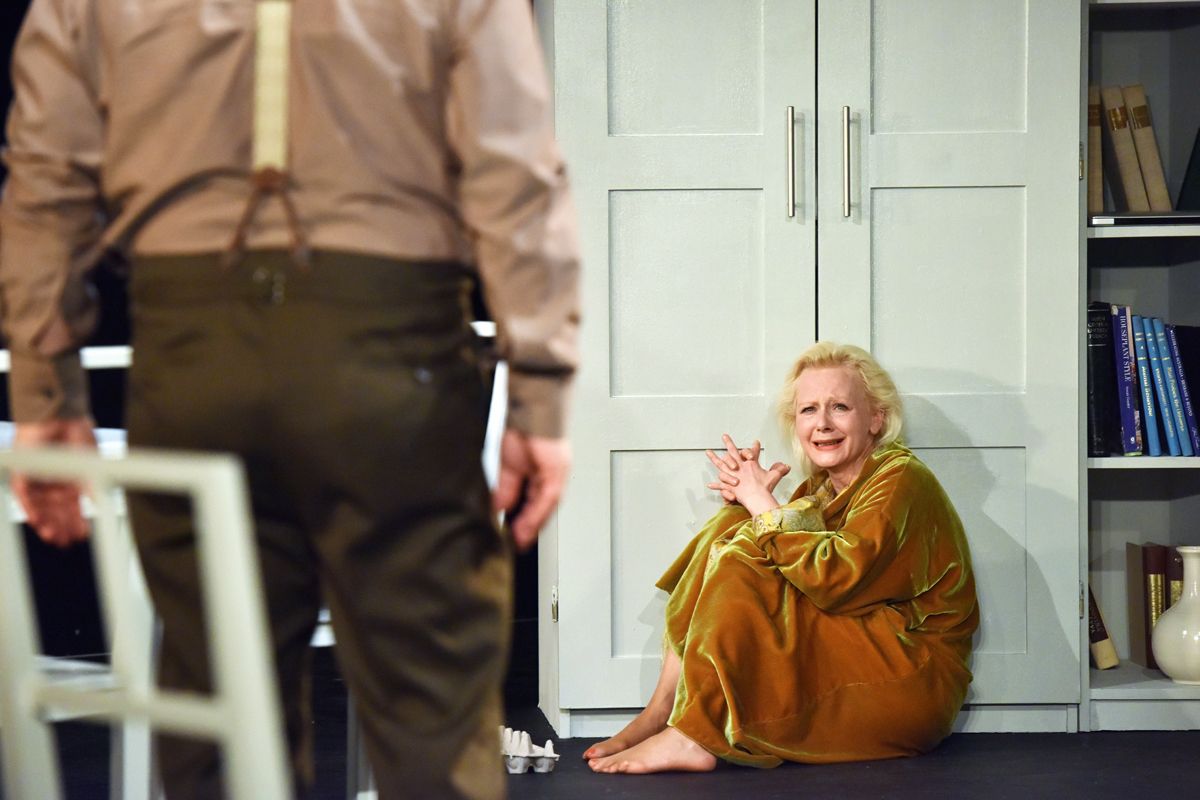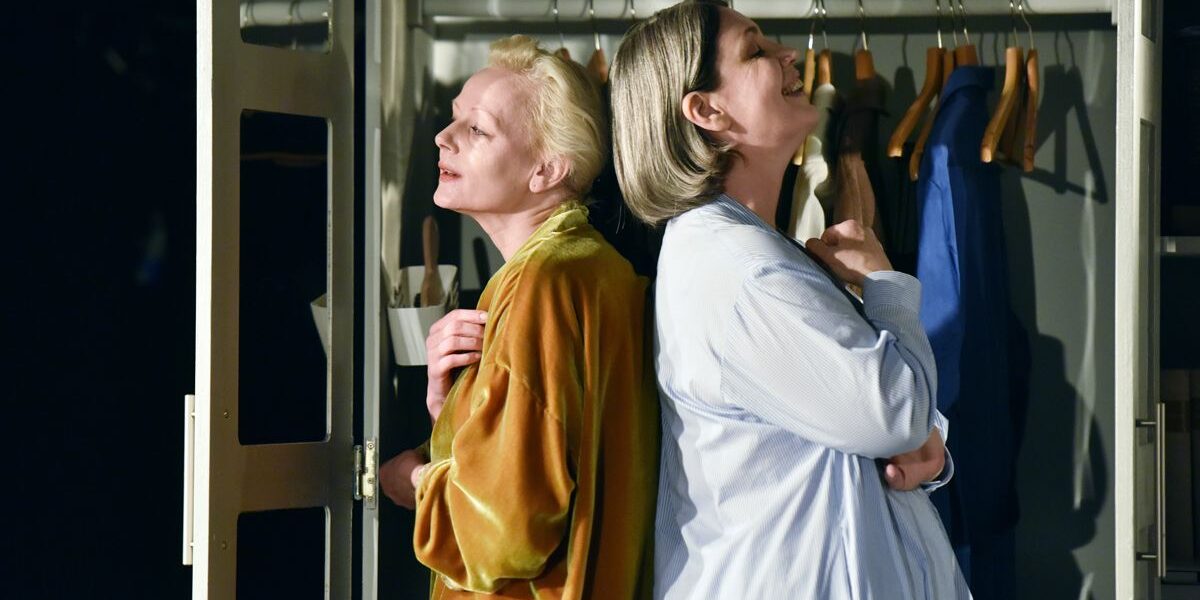SNG Drama Ljubljana, premiere 14th April 2023
It is said we tend to think in two ways – either you have a dialogue with yourself, with whole sentences and ideas, or you are more inclined towards abstraction. Neither is a better way of thinking. But what happens if the ”other you”, stops answering or simply says “I do not know?” What happens if an already abstract thought becomes a complete abstraction, without anything concrete to hold onto? You still think, maybe not as complexly as before, but you still have thoughts. Yet because perhaps you cannot remember, or perhaps you cannot construct a whole sentence anymore or even identify objects or people that you know. You lose a functional way of thinking. You are losing your mind; but that does not mean you are crazy, or not you anymore. It is still you, just different. That is the story of Alice Howland.
Written by neuroscientist Lisa Genova, the 2007 novel Still Alice explored the stages of Alzheimer’s disease in the case of a linguist and cognitive psychology professor Alice Howland. In 2013, the novel was adapted for stage by a director and actor Christine Mary Dunford. It was subsequently turned into a film starring Julianne Moore.
Directed by Matjaž Zupančič, the Slovenian premiere of the play makes it clear why they chose to perform it. As a play Still Alice is not innovative or pioneering. It does not explore themes which have not been explored before. Yet, it contains something within it that catches the audience.
The story begins in March of 2010, as Alice (Polona Juh) is in the kitchen, doing something work-related while helping her husband John (Bojan Emeršič) find his things before he leaves for work. It is quickly established that Alice is under a lot of stress and handling it very well – if anything she seems to enjoy it. She is incredibly sharp and also busy, at the peak of her social life, career, family life and her understanding and acceptance of herself. John seems to be in a similar place, although Alice is handling things graciously – which could also be just Juh’s acting style, her refined approach to movement – while John is more chaotic.
They have two kids, Lydia (Eva Jesenovec) and Thomas (Domen Novak), who are in their twenties and they are more or less taking care of themselves. All is well. Except there is another figure on stage, shadowing Juh. The first woman seems to know intimate things about the other. This other woman (played by Maja Sever) is Her – Alice’s inner voice. Her tells us right at the beginning that she (Alice, therefore Her) has been struggling with destroyed neurons for two, maybe three years now. But, as we all do at times, Alice is pretending that nothing is wrong and is continuing her life as before.
Until she starts slowly, but progressively, losing her words. What does that do to a linguist? It is unimaginable. On stage for the whole two-hour production, Juh’s performance as Alice is as realistic and as subtle as it gets. She is brilliantly real, conveying Alice’s hidden pain and desire to live her life as she has before. She demonstrates Alice’s initial unacceptance silently, simply through the position of her torso and her hands to the point – and I really cannot stress that enough – she embodies someone, who understands everything that is happening to them completely, but has not come to terms with it.

Se Vedno Alice, SNG Drama Ljubljana. Photo: Peter Uhan
At every “breaking point”, as Alice increasingly loses her sense of what is happening, Juh transitions as Alice without drama, while showing the grace and intelligence of her character. Alice does not become self-pitying and even when she does not recognise the people that are closest to her, she handles it with charisma and dignity. The audience is aware of her private thoughts, through the witty exchanges of Her and Alice. This effect is thanks firstly to the text, but also to Juh’s strong performance and to the capable direction of the play.
The support provided by John should not be underestimated either. Dealing with his wife’s progressive condition is not an easy task – and Emeršič’s acting in the role is extremely organic. The actor, who is best known for his comedic roles, plays this tired, resigned husband with respectful seriousness and charm. John;s position is not an enviable one: the more the Alzheimer’s progresses, the more the decision-making falls on him, from filling out questionaries to actually needing to decide everything having to do with Alice.
It is when he accepts a job in another state and their children voice doubts about whether this is right for their mother (as they wouldn’t be as close to her and therefore could not take care of her as much), that John breaks down and shares his feeling – a rare occurrence for people in his type of dilemma. Emeršič’s weighty delivery of this scene brings us to the main point of the play.
John’s choice of whether to take this job and take Alice with him originates in his fear. His daughter asks him beforehand, why he thinks the best decisions are rational and not emotional. John confesses that he knows he is going to lose Alice and when he inevitably does, he will be left with nothing – except maybe this job. He rationalizes so he can survive this extremely difficult time.
It is in this moment that Still Alice really gets to the audience. it offers us a clear mirror of our individual fears – we all fear something, mostly we fear losing. Losing something, losing someone, losing ourselves. When those close to you know, and when you know, that you are right now losing something, it is heartbreaking. And even if not all of us fear losing our minds, we can still relate to this scene, to this fear. Our identity is seldom something to which we are indifferent.
This is an incredibly strong production. It is strongly acted by all of the ensemble and is flawlessly directed by Zupančič. Even the costume design (by Bjanka Adžić Ursulov) is something to applaud. Some of the music, however, feels too loud for the atmosphere of the play and the video we see through the window when Alice cannot remember her address, sometimes moves in the wrong direction. But these are just small details.This is a play full of real tears, from both the actors and audience, a reminder of why we like to (in a more controlled way) lose ourselves in theatre.
Credits:
Director: Matjaž Zupančič//Translator and dramaturg: Tarja Dominkuš//set designer: Janja Korun//Costume designer: Bjanka Adžić Ursulov//Sound and music: Vanja Novak//Video designer: Sandi Skok//Lighting designer: Andrej Hajdinjak
For tickets and further information, visit: Drama.si
Further reading: review of Mrs Dalloway at SNG Drama
Živa Kadunc is a critic of contemporary performance art and a speaker on Radio Študent (Slovenia). She loves her plants.








